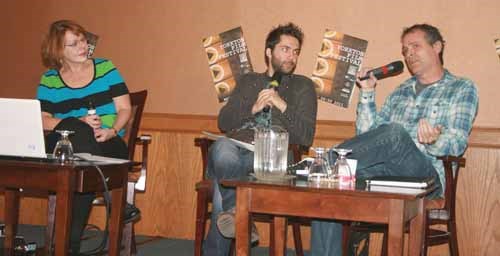The world is changing rapidly in terms of film production with productions now expected to go to multiple Internet platforms as well as television and theatres to attract the maximum number of viewers.
But with all the changes has the core art of storytelling changed?
That was the question a panel tackled at the Yorkton Film Festival Saturday with the topic The Times They Are A Changing - Evolution of Contemporary Storytelling.
In introducing the panel moderator David Cormican said change has been rapid noting as recently as 20-years ago there was no YouTube, or Facebook, are well known ways to promote and tell stories, "and cellphones were just coming off the big block brick."
In terms of stories, Dave Schultz, writer of films such as 45 RPM and Jet Boy, said technology has had less impact than most might think.
"Writing is kind of like cave drawing stuff," he said. "A story is a story."
Cormican said one thing which has changed is the audience, or at least how they view film. He said people seem to have the attention span of "moths on crack."
Lynn Tarzwell, writer, actor, and teacher who runs the one-year graduate certificate Scriptwriting program at Algonquin College said getting and keeping people's attention is a challenge.
"I blame Sesame Street to start with," she said, adding "half the people in this room are fiddling with Blackberries® under the table."
While attention spans seem limited, Schultz said good stories and good films will find viewers.
"People still like to watch good movies," he said.
Schultz said one thing to remember is that writing is not easy, and not everyone can do it.
"People watch TV and think they can write it," he said, adding they shouldn't think that way. "You don't listen to music and think you can pick up a guitar and play it."
The Internet is looked at as a villain by some in the film industry as a vehicle for the distribution of free material which impacts the chance to sell film.
Schultz doesn't see it as the culprit.
"The Internet is more of a positive tool for writers," he said, pointing to research as an example. He said "research is easier" because of the ability to search the 'Net and not have to search through piles of books.
Where technology has changed things is in connecting people, said Tarzwell.
In the past cooperating with other writers and coordinating with producers and directors was a major challenge, she said, adding the idea of the "$500 cup of coffee" (flying to Toronto to talk over a coffee) was pretty standard.
"Face-to-face is preferable, but it's not always possible," she said.
With the connectedness which the Internet has provided Tarzwell said people can literally be anywhere and write, or be part of a film. She said in that respect the playing field is levelled, but also more competitive.
Schultz said while there is a lot of talk about multi-platform options for film, it has not meant more money to filmmakers to create content. In fact, he said the opposite is actually true.
When Schultz started doing TV Showtime was paying $800,000 for a movie-of-the-week, and that is now less than $100,000.
"Money was big in the '90s," he said.
With less money to work with Schultz said how a writer works has been impacted.
"You have to be a faster, tighter writer," he said, noting that "time is money."
With less dollars to shoot a film a writer needs to be aware of filming limitations too, said Schultz, adding you have to limit the number of scenes, because changing locales costs money.
"I won't come in this room (to shoot a scene) unless I can get eight minutes out of it," he said.
Schultz said new writers need to recognize they are unproven commodities and any film they get produced will likely have a very small budget. With that in mind scripts need to reflect the likelihood of a limited budget.
"Don't have a fleet of helicopters coming over the hill," he said.
In terms of money, Tarzwell said new writers in essence have to pay their dues to build their careers.
"You do have to work cheaper for a while to break-in," she said.
Schultz said it often comes down to making the right contacts, but networking with the right people is not always as easy as it might seem.
"You can waste a lot of time talking to the wrong people," he said, adding it can be disheartening "to finally get somebody loving your script and they don't have the money."
Tarzwell said it comes down to doing your networking homework.
"You really need to 'cyberstalk' the people you're going to make your pitch to," she said.
As an example, Tarzwell said a writer would not pitch a script based on World War I to the same people they would pitch a science fiction story to.
Schultz said writers need to understand the market for scripts too.
"No one wants to do drama anymore. You can't sell drama," he said, adding scripts have to fit into popular film genres, suspense, horror, vampires to catch attention.



